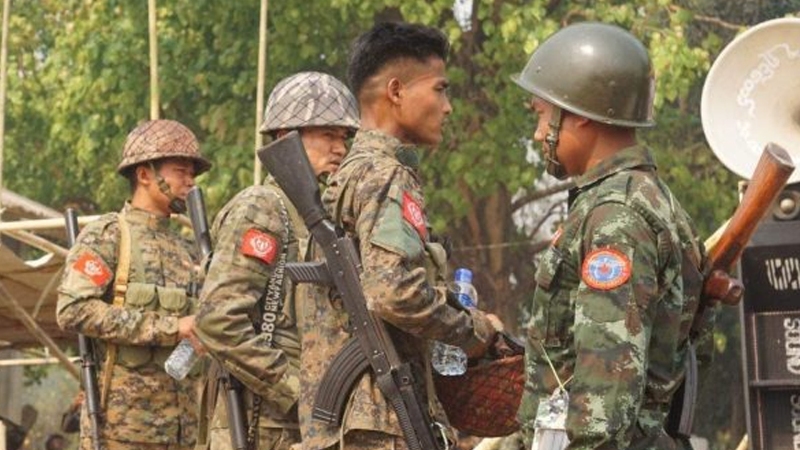The United States’ successful regime change operation in Bangladesh was aimed at installing an America-friendly government in Dhaka that would do its bidding in opening up “security corridors” leading up to the Rakhine State in Myanmar, three Indian officials familiar with the recent developments in eastern neighbour said.
The violent Bangladesh-wide students’ movement, which gathered pace ostensibly on the issue of quotas in government jobs, led to the toppling of the Sheikh Hasina regime and installation of an interim arrangement headed by Nobel Peace laureate Mohammad Yunus.
“The US has been able to achieve its objective of dethroning Hasina who was proving to be an obstacle to Washington’s aims in Myanmar where too it seeks to hit hard against Chinese dominance,” a former Indian envoy to Bangladesh said on the condition of anonymity.
Pointing out that the US “is already providing support to certain rebel groups on the Myanmar-Thailand border zone”, the same former high commissioner said that “while the American regime change operation is linked to the Myanmar civil war, the collateral benefit would be to have hostile governments on India’s flanks for not toeing the US line on Russia”.
Disclosing that the US’ medium and long-term aims are to “control the Rakhine State coast and the St Martin Island”, other Indian officials said that the latter will “perhaps be a halt station, located as it is at the mouth of the Malacca Straits”. They, however, said it was still not clear when and how the US would involve itself in the Rakhine State.
On the other hand, Indian security officials, who are alive to potential future involvement of the US in the Rakhine State, revealed that they have “emerging” evidence of a new Kuki-Chin insurgent group – Kumi National Army (KNA) – in Myanmar.
The KNA, the sources said, has been seen to be operating in areas “corresponding” to Parva and adjoining areas (in Mizoram) where the Arakan Army holds a dominant military position in relation to the Myanmar military junta forces.
The KNA is the armed wing of the Khumi National Democratic Party (KNDP) which is led by its president, Ai Leaung Teng, a Myanmar national. While the Indian security establishment considers the KNA to be an insignificant rebel group in Myanmar operating under the aegis of the Chin Council, its cadres are essentially Myanmar refugees who had previously taken shelter in Mizoram.
Even as Indian foreign and security officials, still waking up to the ground realities in Bangladesh, move to take stock of the situation in Myanmar, especially the Rakhine State where the China-backed Arakan Army enjoys a dominant position, they expect “some US” moves in this region of the civil war-torn country.
Closely aligned with the success of the Arakan Amry is the outfit’s military measures against the Rohingya in Buthidaung and Maungdaw on the west bank of Mayu river. Thousands of Rohingya have fled these two towns in recent weeks, with some seeking shelter in neighbouring Bangladesh.
Early last month, instances of violence and atrocities were committed against Rohingya civilians in Maungdaw. Findings by the Rohingya Human Rights Initiative indicated that over 200 Rohingya civilians, mostly women and children, were killed in attacks (including using drones) by the Arakan Army in the first week of August.
Additionally, between August 5 and 7 as many as 1,800 Rohingya refugees were detained by the Bangladesh border guards of whom about 400 were reportedly pushed back to Myanmar.
Other insurgent groups in Myanmar, especially the National Unity Government (NUG), consider the situation in the country to be “confusing” even they agree that the Arakan Army “is in near-total control of the Rakhine State”. An NUG source said that while the “US doesn’t have strong allies in the region, China remains in control of the military and political situation”.
ALSO READ: A ‘new’ Bangladesh: Where is the roadmap for taking a deeply divided country out of the woods?
The US, NUG sources said, was not in a “sound position” in Thailand where a change in government followed by the parliament’s swift approval of a new Prime Minister, Paetongtarn Shinawatra, last month will continue to help China’s objective.
Shinawatra, Myanmar political analysts said, has been a long-time supporter of China which could deliver a setback to US efforts based on the stated objectives of the Burma Act. “Besides, China’s hard stance on Taiwan has acted as a check on the US,” the same analysts said.















